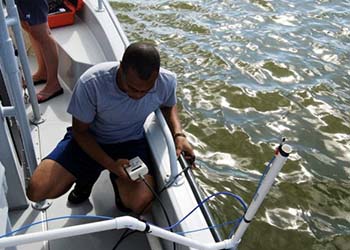Improve our Planet: How to Become an Environmental Scientist

Improve Our Planet: How to Become an Environmental Scientist
Environmental science isn’t just about tree species and rock formations. It’s the study of humanity and the planet we call home — and how the two affect each other. As we grow more aware of how the environment impacts our society and, conversely, how we influence our environment, we begin to unearth a complex, fascinating, and profoundly important relationship. Environmental scientists are at the forefront of these crucial discoveries.
The Importance of Environmental Science
One of the foremost pioneers of environmental science as we know it today is Robert D. Bullard, an HBCU grad. Bullard is revered for his campaign against environmental racism, which focuses on how marginalized and low-income communities face disproportionate environmental burdens. His work earned him the moniker “the father of environmental justice,” and today, his field is an integral and essential part of the global fight for both environmental and social progress.
And as climate change continues to alter the world around us, environmental science has become a pressing need for our present and our future. Mass species extinction, changing ecosystems, extreme weather occurrences, natural resource depletion, and more: all of these are urgent environmental issues that we need to understand and explore.
The Ongoing Need for Black Representation in Environmental Science
While the importance of this area of study calls for more engagement among all people, Black representation in particular is crucial and urgently needed in the field. Critically, it ensures that diverse perspectives and experiences are included in understanding and solving environmental challenges, which disproportionately impact Black and other marginalized communities worldwide.
Additionally, while Bullard and others have made landmark advancements in environmental science and related areas, Black scientists have been historically underrepresented. Black professionals bring unique cultural insights and innovative approaches that can lead to more equitable and sustainable environmental practices. Moreover, increasing Black representation can inspire future generations to engage in STEM fields, thereby enriching the scientific community with broader viewpoints and enhancing collaborative efforts to address global issues like climate change, conservation, and environmental justice. This not only helps challenge and dismantle systemic inequalities within the field but also promotes a more inclusive approach that benefits societal well-being and ecological health globally.
As a student of environmental science, you can join that cause and add your voice, background, and unique perspective to the field. As a bonus, you can do well for yourself along the way; STEM careers are generally in high demand and often come with a good salary.
So, are you ready to dive deeper? Here’s how you can get started in environmental science, the careers you can explore, and all the info you need to prepare for success.
How to Get Started

Bethune-Cookman University
You may not be making any groundbreaking discoveries quite yet, but it’s not too early to start setting yourself up for great achievements. While in high school, it’s a good move to take advanced math and science classes. If your school offers them, AP biology, AP chemistry, and — of course — AP environmental science will be especially helpful in preparing you for college-level work.
In your free time, seek out extracurricular opportunities that focus on your specific areas of interest, such as an environmentalism club. Read up on new developments and related topics. As you get more involved, you’ll be able to hone in on your specific interests. Specializations abound. You could find your niche in archeology, ecology, meteorology, zoology, or climatology, among others. If technology excites you, you could explore cutting-edge advances in remote sensing, climate modeling, or environmental applications of biotechnology.
Wherever specific interests lie, students who plan to pursue careers in environmental science will need to enroll in a degree program. Majors in this field include a wide range of related course subjects, such as:
- Geographic information systems (GIS)
- Chemistry
- Biology
- Mathematics
- Statistics
- Physics
- Botany
- Atmospheric and ocean sciences
- Chemical engineering
- Environmental engineering
- Space sciences
Careers in Environmental Sciences
Graduates in this field may pursue career paths in a wide variety of capacities. Some possible roles include:
- Agricultural scientist
- Environmental consultant
- Air pollution analyst
- Natural resource manager
- Recycling officer
- Environmental educator
- Nature conservation officer
- Environmental engineer
- Meteorologist
- Zoologist
Want to learn more about this possible career path and college major? Have questions about which UNCF colleges and universities offer degrees in environmental science? Looking for help with financing this degree?
Click Here So We Can Help You!

How to Prepare for Success
In order to be successful, students in environmental science should be great at science and math, be out-of-the-box problem solvers, and have a passion for protecting natural resources. If you’re fascinated not only by natural systems but also by their social impact, you’ll never run out of new ideas to explore and investigate. To help you fund your education, check out The Fund II Foundation UNCF STEM Scholars Program and other STEM scholarships.
Schools to Consider
Once college is on the horizon, it would be a smart idea to seek out a university that is equipped to give you a high-quality education that will prepare you for a successful career. To enter the field of environmental science, students must earn a minimum of a bachelor’s degree—and preferably graduate degrees—in this field. These UNCF-member schools offer programs in environmental science:
- Spelman College
- Tuskegee University
- Claflin University
- Florida Memorial University
- Bethune-Cookman University
- Huston-Tillotson University
- Benedict College
- Paine College
- Miles College
Professional Organizations
There are also many environmental science organizations that can provide more insight into some of the specializations in this discipline. Just a few of them include:
- Air and Waste Management Association (A&WMA)
- Association of Climate Change Officers (ACCO)
- Association of Environmental and Resource Economists (AERE)
- Environmental Design Research Association (EDRA)
- Environmental Information Association (EIA)
- National Association of Environmental Professionals (NAEP)

Scholarships Available
There’s no better way to start on your path toward a successful career in environmental science than with a solid financial foundation. Fortunately, many scholarships are available through UNCF, including some specifically for environmental science majors. Keep an eye on the UNCF website for current scholarship opportunities and announcements.
Search for specific scholarships and view those that are currently accepting applications here! Students should also check with each college or university to see if there are additional scholarships available to study environmental science.
As you explore your options, be sure to use our guide to applying for scholarships and grants. You can also receive guidance by submitting a major interest form if you are interested in a career in environmental science. Submit the form on our website to get started. And follow us on UNCF social media channels to receive notifications about our scholarships and member HBCUs. Reach out today!